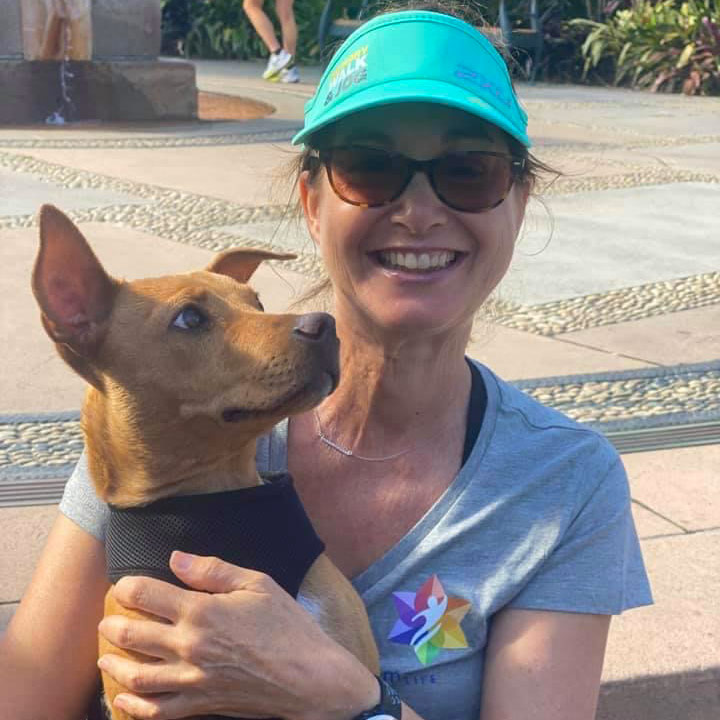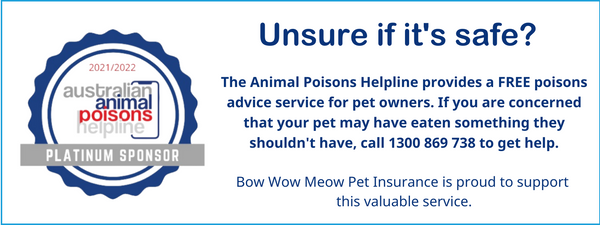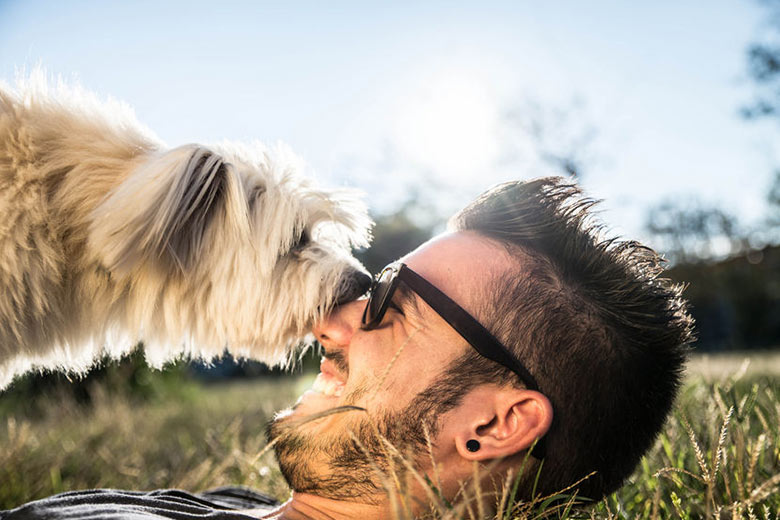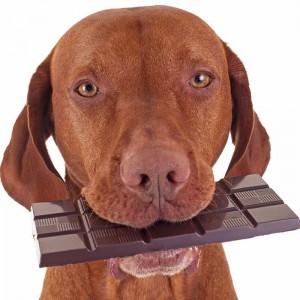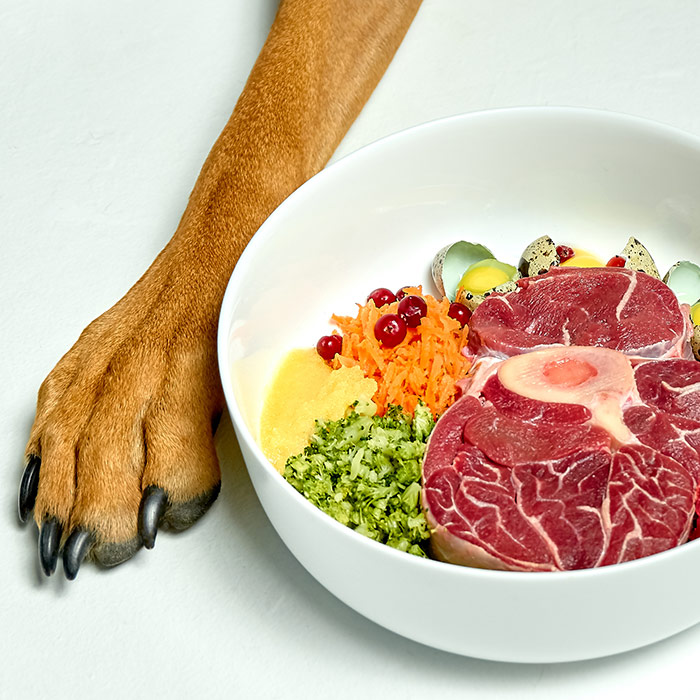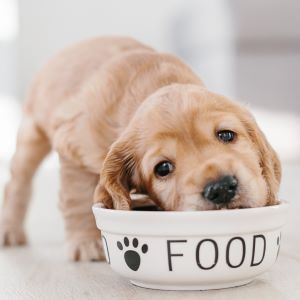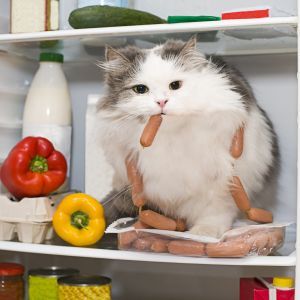Good and bad human foods – What to feed and what to not feed your dog
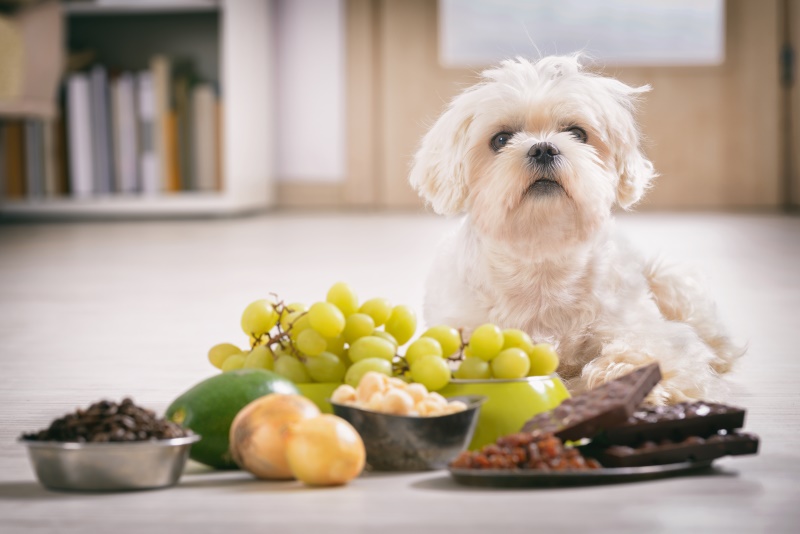
Like many dog owners, you probably have some understandable concerns about what to feed your new dog. You may be aware that certain human foods, like chocolate and xylitol, are a ‘no-no’ when it comes to feeding your new dog.
But do you know that there are many other examples of foods bad for dogs sitting in your refrigerator or pantry right now? In fact, some of these common ‘human foods’ are downright dangerous foods for dogs, so it is essential that you know which these are and what symptoms to look out for if your dog manages to sink his teeth into any of them.
Foods bad for dogs – what NOT to feed your dog
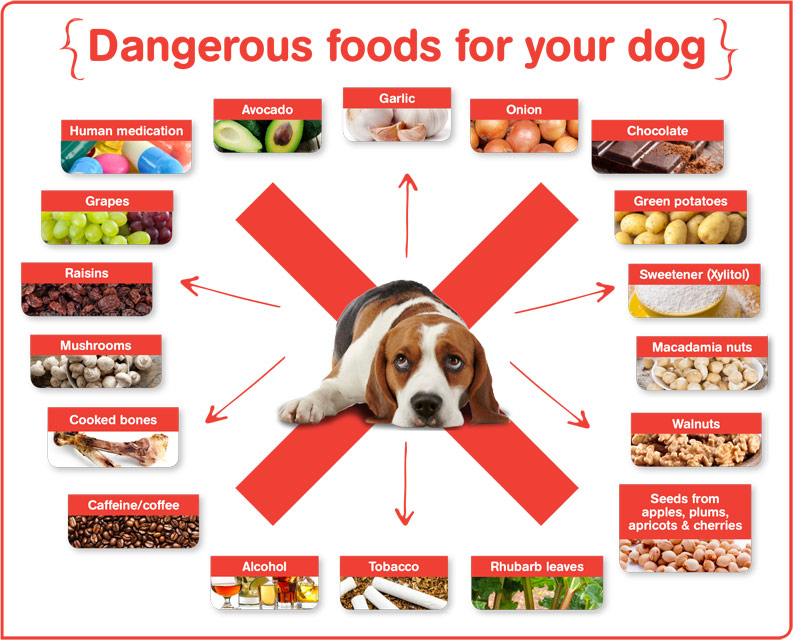
Common human foods bad for dogs include:
Chocolate and cocoa
Most people are aware that chocolate is one of those yummy human foods harmful to dogs. The reason is that chocolate contains theobromine, which is toxic for dogs. Generally, the darker the chocolate, the greater its toxicity. If your dog has eaten chocolate, the calculator below can help to assess the level of chocolate toxicity.
Chocolate may also contain nuts, fats and caffeine, all of which are also on the list of what not to feed your dog.
Symptoms of chocolate toxicity: vomiting, diarrhoea, urination, hyperactivity, heart arrhythmias, tremors, seizures
Read more: Why Is Chocolate Bad For Dogs?
Onions, garlic, chives and leeks
These flavoursome foods are all members of the Allium family and are poisonous to dogs and cats. Ingestion of just a small amount of these dangerous foods for dogs can cause gastrointestinal irritation and oxidative damage to the red blood cells, which can lead to anaemia. Even in cooked, powdered or dehydrated form, they can be toxic, although garlic is about 5 times more potent than onion. Do not grow them in your garden where your dog can access them. The onset of poisoning may take some time, with symptoms not appearing for several days.
Symptoms of anaemia: panting, weakness, lethargy, pale gums, elevated heart rate, breathing difficulties, exercise intolerance, collapse
Symptoms of gastroenteritis: nausea, vomiting, drooling, oral irritation, abdominal pain, diarrhoea
Green potatoes
While a plain baked or boiled potato is safe for your dog, do not allow him to eat any raw potatoes or any potato plants from your pantry or garden. This is because raw green potatoes contain a substance called solanine which can be toxic to some dogs, resulting in “green potato poisoning”.
Symptoms: vomiting, lethargy, coordination problems
Xylitol
Xylitol, the sweetener or sugar substitute found in many varieties of chewing gum, candy, baked goods, toothpaste and vitamins, is near the top of the list of dangerous foods for dogs. It can cause the rapid release of insulin in dogs and result in hypoglycaemia. In some cases, xylitol poisoning can lead to liver failure within a few days of ingestion.
Symptoms: vomiting, weakness, lethargy, coordination problems, seizures
Bow Wow Meow Pet Insurance can help protect you and your dog should an unexpected trip to the vet occur.
- Find out more about our dog insurance options
Seeds from apples, peaches, plums, apricots and cherries
The seeds, as well as the stems and leaves, of these common fruits contain cyanide, which is poisonous if consumed. Larger pips can cause intestinal obstruction. While we know not to eat the seeds, our dogs do not, so it is best to keep the fruit bowl out of their reach.
Symptoms: difficulty breathing, panting, shock
Rhubarb and rhubarb leaves
Rhubarb is a vegetable that is often used in pies, jams, sauces and juice. Rhubarb leaves and stems contains soluble oxalates which can induce poisoning if ingested in large enough quantities. This can trigger abnormalities of the nervous system, kidneys and digestive tract. Rarely, acute renal failure can result.
Symptoms: drooling, vomiting, diarrhoea, lethargy, weakness, tremors, loss of appetite, bloody urine, changes in thirst or urination.
Tobacco
Tobacco is high on the list of what not to feed your dog. Exposure to nicotine in tobacco initially causes low heart and respiratory rates which then change to overstimulation. It can ultimately result in the animal’s death.
Symptoms: uncontrolled urination and/or defecation, tremors, seizures, paralysis
Macadamia nuts
Nuts are high in fat content, which can cause stomach upsets and pancreatitis in your dog. Some nuts are dangerous to dogs, for example, macadamias and mouldy walnuts can be toxic and cause poisoning. Just a handful of raw or roasted macadamias can make your dog really sick. Chocolate with nuts delivers a double blow and is high on the list of what not to feed your dog.
Symptoms: lethargy, vomiting, loss of muscle control, weakness in the back legs, high temperature
Alcohol
Wine, beer and other alcohol can be toxic, and even deadly, for to your dog. Likewise, all foods or drinks containing even a small amount of alcohol are foods bad for dogs. Alcohol is rapidly adsorbed into the dog’s bloodstream and just a drop can cause dangerous declines in blood sugar, blood pressure and body temperature. The effects are even worse in smaller breeds.
Symptoms: vomiting, diarrhoea, coordination problems, seizures, breathing difficulties, respiratory failure, coma
Caffeine/coffee
 A small amount of caffeine can affect the heart, stomach, intestines and nervous system, while a large dosage can be fatal. Caffeine is not just found in coffee and tea. Other foods bad for dogs because of their caffeine content include energy drinks, energy bars, chocolate, cocoa, colas and some medications, including diet pills, pain killers and cold medicines.
A small amount of caffeine can affect the heart, stomach, intestines and nervous system, while a large dosage can be fatal. Caffeine is not just found in coffee and tea. Other foods bad for dogs because of their caffeine content include energy drinks, energy bars, chocolate, cocoa, colas and some medications, including diet pills, pain killers and cold medicines.
Symptoms: restlessness, hyperactivity, excessive panting, seizures, muscle twitching, increased urination, increased heart rate, increased blood pressure.
Cooked bones
While it seems natural to give a dog a bone, cooked bones are actually choking hazards for dogs. They can splinter, causing stomach lacerations and obstructions within the digestive system.
Symptoms: vomiting, lethargy, diarrhoea, abdominal pain or discomfort, drooling
Raisins & grapes
Yet another example of human foods harmful to dogs, these need to be kept away from your dog at all costs. Both grapes and raisins can cause acute kidney failure in most breeds, reducing the ability to produce urine and thereby filter toxins out of the body. Ingesting just a few can be extremely harmful, depending on the size of your dog.
Symptoms: repeated vomiting, lethargy, depression, diarrhoea
Read more: Can dogs eat grapes? Everything you need to know
Mushrooms
While there are several thousand species of mushrooms, only a small number are known to be toxic. These can cause severe problems to various organ systems, including the kidneys, liver and brain, and can even result in death. All mushroom ingestion should therefore be considered toxic.
Symptoms: seizures, coma, vomiting
Read more: Can dogs eat mushrooms? Everything you need to know
Avocados
Although super healthy for us, avocado is another one of those human foods bad for dogs. It contains persin, which is known to give dogs an upset stomach. Persin is also in the fruit’s leaves, pip and bark, so if you have an avocado tree in the garden, keep your dog away from it – avocados are definitely on the list of what not to feed your new dog. Ingestion of the pip can potentially cause an obstruction in the digestive tract, which can be fatal.
Symptoms: vomiting, diarrhoea
Read more: Can dogs eat avocado? Everything you need to know
Milk and dairy products
While not toxic to dogs, dairy products can disrupt their digestive system and even trigger food allergies. Dogs lack lactase, the enzyme that is needed to digest the lactose contained in dairy products. When determining what to feed your dog, it’s best to cross dairy off the list.
Symptoms: diarrhoea, vomiting, itching
Human medication
Taking medication designed for people can make dogs very sick. Common ingredients in pain relievers, cold medicines and other medicines contain ingredients that can be deadly. Human medication is definitely on the list of dangerous food for dogs, and can even be deadly, so it is best to keep all medicines locked away and out of your dog’s reach.
Symptoms of ingestion of foods harmful to dogs
If your dog ingests any of these or other dangerous foods for dogs, it is important to know what signs and symptoms to look out for. Toxicity will vary depending on the breed, size and age of the dog. While these potentially poisonous foods are bad for all dogs, they are even more potent for smaller breeds, like shih tzus, Yorkies and chihuahuas. It is advisable to contact your vet or the animal poison line immediately if your dog is having a bad reaction, particularly if he has ingested cooked bones, grapes or raisins, onions or garlic, nuts, xylitol or chocolate.
Common symptoms of poisoning include:
- Fever
- Collapse
- Seizures
- Drooling
- Lethargy
- Vomiting
- Tremors
- Diarrhoea
- Weakness
- Restlessness
- Hyperactivity
- Bloated stomach
- Muscle twitching
- Excessive panting
- Excessive urination
Good for humans, good for dogs – food you can feed your dog
Many healthy foods that are good for us are relatively good for dogs, given in small quantities as an occasional treat. However, it’s important to research the experts’ recommendations what to feed your dog (and of course, what not to feed your dog) before you do so.
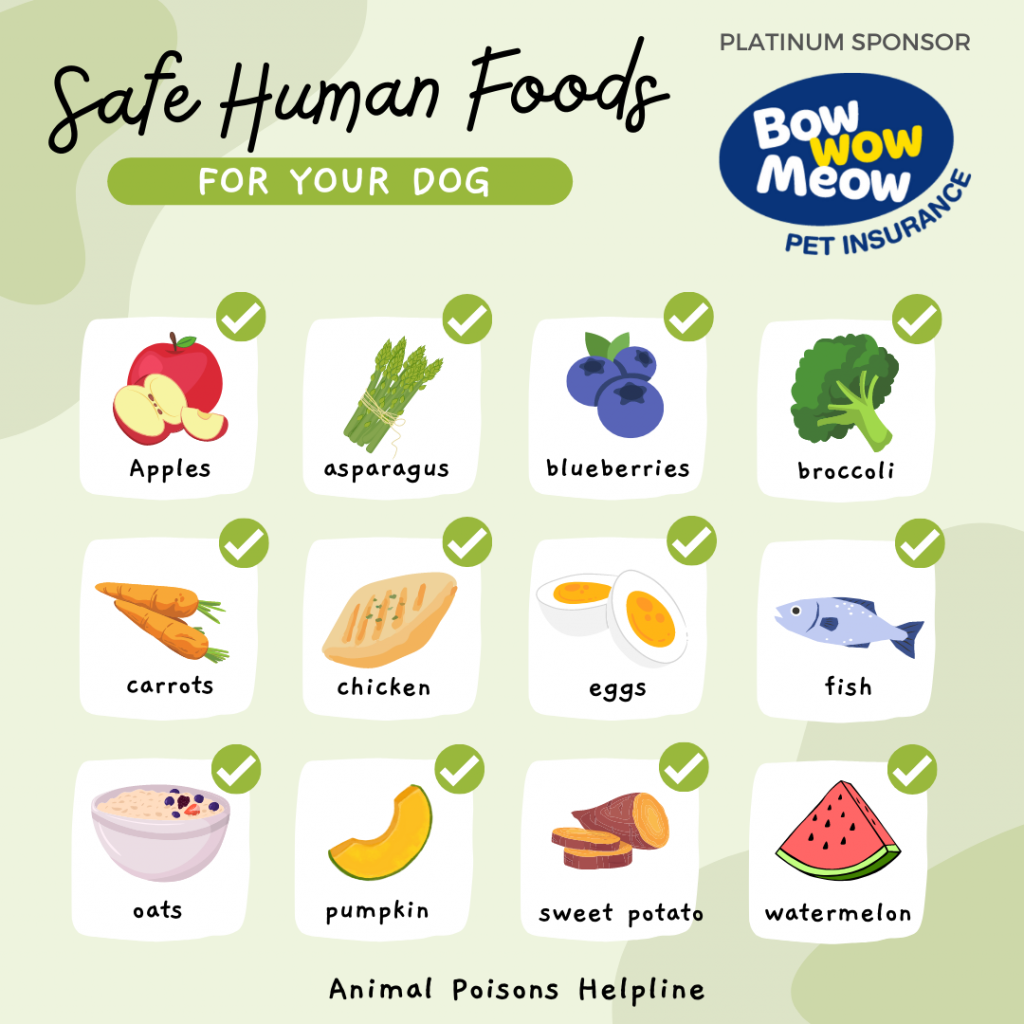
Some of our favourite “healthy people treats” for dogs are:
Apples (without the seeds)
A great healthy snack and an excellent source of vitamins A and C. Cut in slices and remove all the seeds, stem and leaves.
Read more: Can dogs eat apples? Everything you need to know
Carrots
Many dogs enjoy the crunchiness of carrots and the slightly sweet taste. Try them as whole for your dog to chew nor cut in small pieces as treat
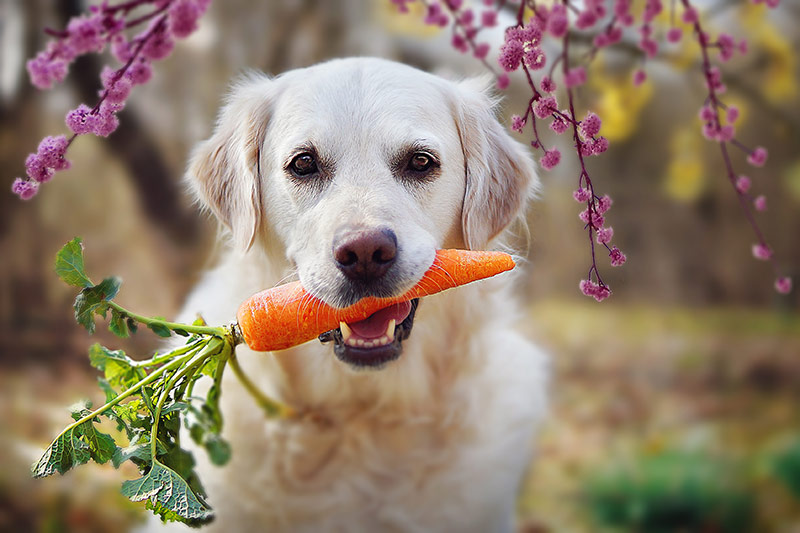
Cooked chicken meat
This is great as training treat and filled with good fats and proteins that dogs need to maintain a healthy weight and energy level. Avoid the fatty parts of the meat, including the skin, and recipes containing strange vegetables, oils, heavy seasoning or wines. Remove all the bones too.
Salmon
A healthy source of protein and a good source of omega 3 fatty acids, which are good for your dog’s coat and skin health.
Peanut butter
A great source of added protein and fibre for your dog. Add a tablespoon to his dry food, making sure to choose an all-natural brand with no added oils or salt. However, don’t add too much as peanut butter can be a bit rich for dog’s digestive systems, especially puppies.
Bananas, blueberries, strawberries, raspberries
These little treats can be enjoyed on their own or mixed with your dog’s daily food. You can even freeze them with some yogurt for a frozen treat on hot days.
Read more:
- Can dogs eat banana? Everything you need to know
- Can dogs eat blueberries? Everything you need to know
- Can dogs eat strawberry? Everything you need to know
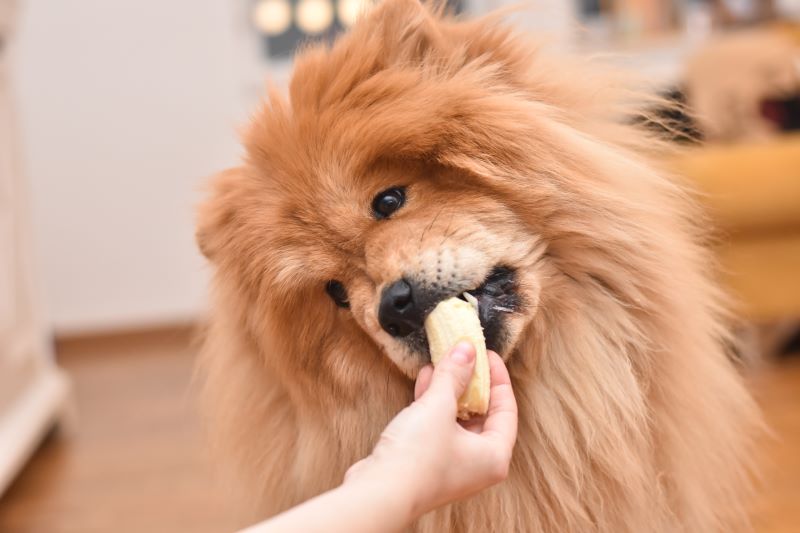
Raw egg
Raw eggs are a great source of protein. Feed in moderation. Organic egg shells can be ground and mixed in your dogs food.
Yogurt
Natural or Greek yogurt acts as a pro-biotic and provides a great source of protein. Avoid sweetened varieties, including those sweetened with ‘natural’ sugars.
In a nutshell…
When deciding what to feed your dog, consider human food as an occasional treat, not as a replacement for dog food. Although the foods listed as healthy above are good for dogs, too much can upset their digestion or make it harder for them to eat their own food. A few small pieces of chicken or salmon can be a great reward if your dog is behaving well or learns a new trick.
Bow Wow Meow Pet Insurance can help protect you and your dog should an unexpected trip to the vet occur.
-
Find out more about our dog insurance options
-
Get an online pet insurance quote
Bow Wow Meow is proud to have been awarded winner of Canstar’s ‘Most Satisfied Customers’ Award in the Pet Insurance category for both 2024 and 2025!
Bow Wow Meow is proud to have been chosen as Product Review’s Pet Insurance Award Winner every year from 2018 to 2025! This is based on 2,995 independent customer reviews (as at 21/01/2025), with an overall rating of 4.3*
Google Review rating = 4.5* (based on 968 reviews)
Trust Pilot rating = 4.6* (based on 531 reviews)
Bow Wow Meow is proud to have been chosen as Product Review’s Pet Insurance Award Winner every year from 2018 to 2025! This is based on 2,995 independent customer reviews (as at 21/01/2025), with an overall rating of 4.3*
Google Review rating = 4.5* (based on 968 reviews)
Trust Pilot rating = 4.6* (based on 531 reviews)
Bow Wow Meow has been chosen as a winner in the Finder Pet Insurance Awards 2024. Finder’s panel of experts analysed over 140 quotes to award our Ultimate Care Plan the winner of the “Pet Insurance – Value” category.

